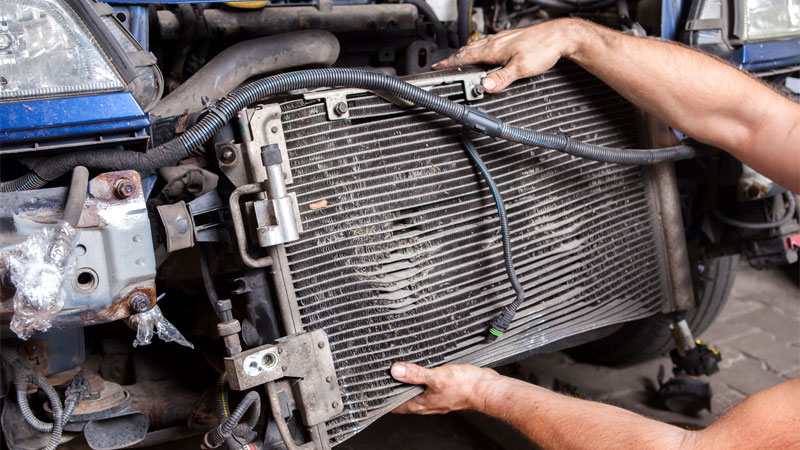Your car should never overheat under normal operating conditions. If you’re dealing with intermittent overheating issues, your vehicle may have one of the problems on this list.
Reasons Air Conditioning Causes a Car to Overheat
When a car overheats, it usually indicates a mechanical problem with the cooling system. Sometimes, a car can also overheat because the cooling system is overloaded. Here are some reasons your AC could cause your vehicle to overheat.
1) Low Coolant

If you’re having issues with your car overheating, one of the first things you want to check is that your coolant level is topped up. Low coolant will introduce air pockets into the cooling system. Air does not cool as efficiently as a liquid, so your engine will run hotter.
Wait until the engine is completely cool before removing the radiator cap. If you need to add coolant, make sure to bleed the air out of the cooling system to make sure there are no air pockets left over.
2) Overloaded Cooling System

If you’re driving up a steep hill on a really hot day, your cooling system may not be able to dissipate heat quickly enough. This is especially true if you are towing or hauling a heavy load.
Air conditioning moves heat from one location to another. This heat needs to be dissipated through the condenser in the AC system. Your car might have just enough cooling capacity to cool the engine by itself, but not when the AC is running.
Sometimes your radiator or condenser can be upgraded to increase your vehicle’s cooling capacity. This is a common modification on sports cars that see heavy track use and vehicles that tow.
3) Restriction In Airflow

If you have debris blocking the radiator or a substantial number of bent fins, your radiator and condenser may not be able to get sufficient airflow to cool the engine. Since the radiator and condenser are typically stacked right next to each other, a problem with airflow is likely to affect both units.
A few bent fins will have a negligible impact on cooling capacity. However, if your radiator has a large number of bent fins this could cause an issue under heavier loads.
Although it’s quite tedious, sometimes fins can be bent back into shape to improve airflow. Be careful if you attempt to do this yourself; you don’t want to puncture the radiator.
Read Also: 5 Symptoms of an Overheating Engine
4) Bad Radiator Fan

If your radiator fans die, there won’t be enough airflow across the radiator and condenser when you’re idling or moving slowly. If your car only overheats while you’re sitting still, the issue might be a bad radiator fan.
Why Do Cars Get Hot?
An internal combustion engine is powered by small explosions. Air and fuel are injected into the combustion chamber, then the combustion chamber is sealed. As the piston travels upward, this compresses the air-fuel mixture.
At a precise moment in the piston’s travel, the spark plug fires to ignite the fuel. This ignition forces the piston back down, turning the crankshaft.
Engines are designed to work in a specific operating temperature range. If the engine is too cold, it won’t run efficiently. If the engine is too hot, parts can melt, the heads can warp, the block may crack, and the head gaskets can leak.
Coolant circulates through an engine to prevent the engine from running too hot. Once the engine starts to get a little too warm, the thermostat opens to allow coolant to flow from the radiator into the engine block. Once the engine cools down to the target temperature, the thermostat closes and the process repeats.
- 5 Most Common Car Repairs in the US (And Average Cost) - April 23, 2024
- Cars with an LS3 Engine (And Why They’re So Popular) - March 26, 2024
- 5 Ways to Tell Your Catalytic Converter Has Been Stolen - March 4, 2024

